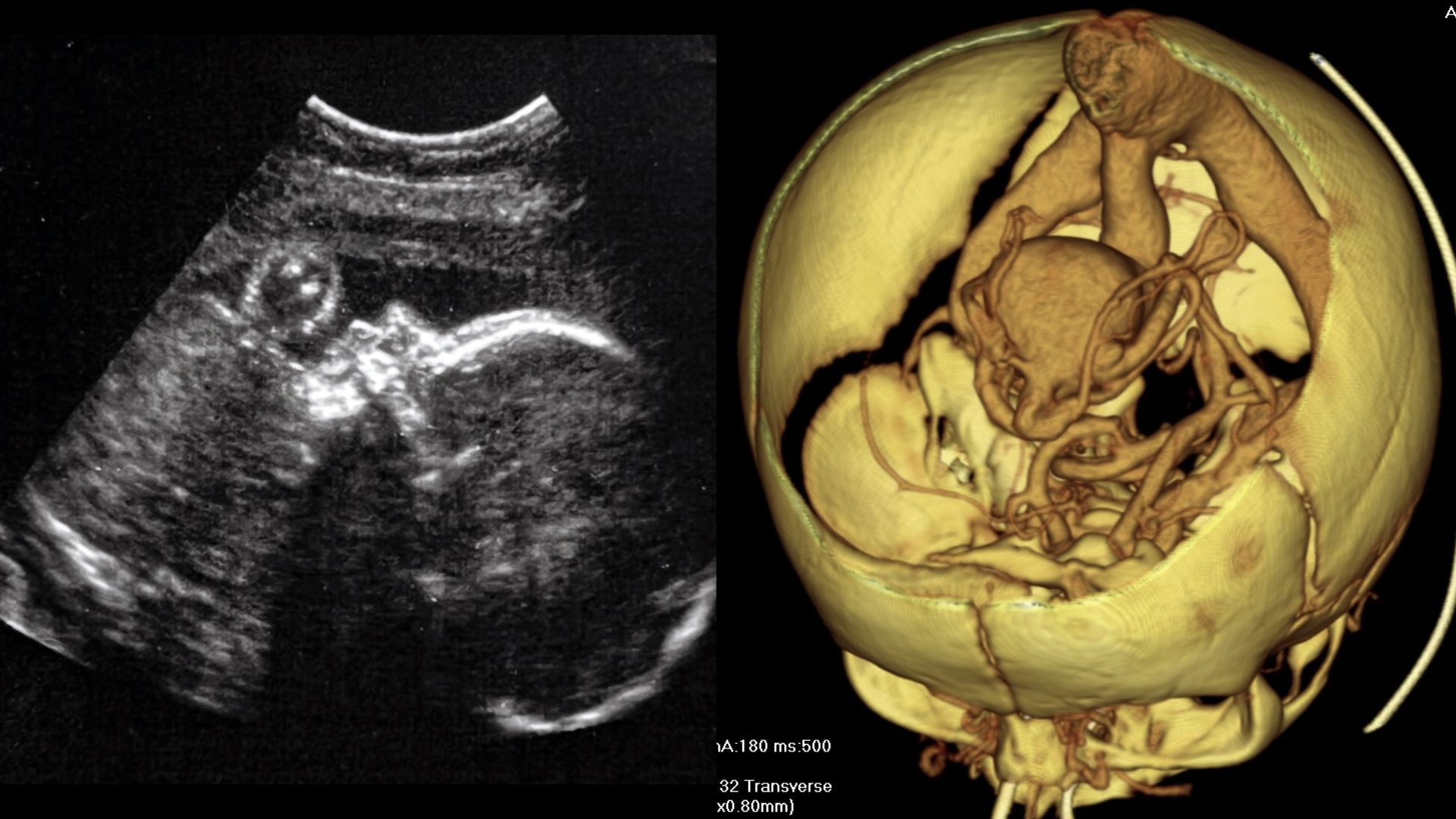Doctors perform 1st-of-its-kind brain surgery on a fetus in the womb
Doctors performed a first-of-its-kind brain surgery on a fetus in the womb to repair a malformed blood vessel.

For the first time, doctors surgically repaired a malformed blood vessel in a baby's brain while she was still in the womb. The baby, born in mid-March, was discharged from the hospital a few weeks after birth and has not required any medications or other treatments since then.
"I heard her cry for the first time and that just, I — I can't even put into words how I felt at that moment," Kenyatta Coleman of Baton Rouge, Louisiana, the baby's mother, told CNN. "It was just, you know, the most beautiful moment being able to hold her, gaze up on her and then hear her cry."
In a new report, published Thursday (May 4) in the journal Stroke, doctors described the first-of-its-kind procedure, which was conducted as part of an ongoing clinical trial. The trial is aimed at finding a new way to treat vein of Galen malformation (VOGM), a rare abnormality that affects the blood vessels that carry oxygenated blood from the heart to the brain.
In VOGM, certain arteries in the brain don't link to capillaries — delicate, branching blood vessels that help slow blood flow — as they normally would. Instead, the arteries dump blood into veins at the base of the brain, and this blood flows at a high pressure. The high-pressure blood flow can cause congestive heart failure, high blood pressure in the arteries of the lungs (pulmonary hypertension), brain tissue injury and loss, or an enlarged head (hydrocephalus).
Related: In a 1st, baby's heart defect successfully treated with injected stem cells
VOGM affects an estimated 1 in 60,000 births, according to a statement from the American Heart Association (AHA). The standard treatment takes place after birth and involves blocking off the artery-to-vein connections within the malformation. However, this procedure can't always reverse the onset of heart failure, and it can be too late to prevent disabling or life-threatening brain damage.
Doctors from Boston Children's Hospital and the Brigham and Women's Hospital in Boston launched a trial to treat VOGM sooner, while the fetus is still in the womb. The new approach uses an in utero surgery designed to reduce the aggressive blood flow through the VOGM. The trial will include an estimated 20 babies, in total, and the recently treated baby, Denver Coleman, was the first to undergo the procedure.
Get the world’s most fascinating discoveries delivered straight to your inbox.
"In our first treated case, we were thrilled to see that the aggressive decline usually seen after birth simply did not appear," Dr. Darren Orbach, co-director of the Cerebrovascular Surgery & Interventions Center at Boston Children's Hospital, an associate professor of radiology at Harvard Medical School and lead author of the case report, said in the AHA statement.
"We are pleased to report that at six weeks, the infant is progressing remarkably well, on no medications, eating normally, gaining weight and is back home," Orbach said. "There are no signs of any negative effects on the brain."
Denver and Kenyatta Coleman underwent the "transuterine" procedure 34 weeks and two days into the pregnancy. (The VOGM was diagnosed just after an ultrasound at 30 weeks, according to CNN.)
Following the procedure, Kenyatta Coleman began leaking amniotic fluid, meaning her "water had begun to break," so doctors delivered the baby by induction of vaginal birth two days later. The newborn did not require any cardiovascular support or surgery after birth but was monitored in the neonatal intensive care unit for several weeks before discharge.
"While this is only our first treated patient and it is vital that we continue the trial to assess the safety and efficacy in other patients," Orbach said, "this approach has the potential to mark a paradigm shift in managing vein of Galen malformation where we repair the malformation prior to birth and head off the heart failure before it occurs, rather than trying to reverse it after birth."

Nicoletta Lanese is the health channel editor at Live Science and was previously a news editor and staff writer at the site. She holds a graduate certificate in science communication from UC Santa Cruz and degrees in neuroscience and dance from the University of Florida. Her work has appeared in The Scientist, Science News, the Mercury News, Mongabay and Stanford Medicine Magazine, among other outlets. Based in NYC, she also remains heavily involved in dance and performs in local choreographers' work.
 Live Science Plus
Live Science Plus






